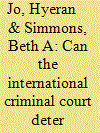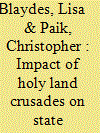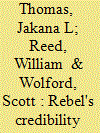|
|
|
Sort Order |
|
|
|
Items / Page
|
|
|
|
|
|
|
| Srl | Item |
| 1 |
ID:
147547


|
|
|
|
|
| Summary/Abstract |
Whether and how violence can be controlled to spare innocent lives is a central issue in international relations. The most ambitious effort to date has been the International Criminal Court (ICC), designed to enhance security and safety by preventing egregious human rights abuses and deterring international crimes. We offer the first systematic assessment of the ICC's deterrent effects for both state and nonstate actors. Although no institution can deter all actors, the ICC can deter some governments and those rebel groups that seek legitimacy. We find support for this conditional impact of the ICC cross-nationally. Our work has implications for the study of international relations and institutions, and supports the violence-reducing role of pursuing justice in international affairs.
|
|
|
|
|
|
|
|
|
|
|
|
|
|
|
|
| 2 |
ID:
147550


|
|
|
|
|
| Summary/Abstract |
Holy Land Crusades were among the most significant forms of military mobilization to occur during the medieval period. Crusader mobilization had important implications for European state formation. We find that areas with large numbers of Holy Land crusaders witnessed increased political stability and institutional development as well as greater urbanization associated with rising trade and capital accumulation, even after taking into account underlying levels of religiosity and economic development. Our findings contribute to a scholarly debate regarding when the essential elements of the modern state first began to appear. Although our causal mechanisms—which focus on the importance of war preparation and urban capital accumulation—resemble those emphasized by previous research, we date the point of critical transition to statehood centuries earlier, in line with scholars who emphasize the medieval origins of the modern state. We also point to one avenue by which the rise of Muslim military and political power may have affected European institutional development.
|
|
|
|
|
|
|
|
|
|
|
|
|
|
|
|
| 3 |
ID:
147551


|
|
|
|
|
| Summary/Abstract |
To reach agreement, international negotiators often compromise by using flexible language: they make controversial provisions vague, or add options and caveats. Does flexibility in agreement language influence subsequent state behavior? If so, do states follow both firm and flexible language somewhat, as negotiators hope? Or do governments respond strategically, increasing their energies on firmly specified tasks, and reducing their efforts on flexibly specified ones? Testing theories about agreement language is difficult because states often reserve flexible language for controversial provisions. To make causal claims, we study an unusually drafted agreement in which states had almost no opportunity to dilute agreement language. We examine the influence of the 1991 Paris Principles on the Design of National Human Rights Institutions (NHRIs), using an original data set of twenty-two institutional safeguards of NHRIs in 107 countries, and case studies. We find that variations in agreement language can have large effects on state behavior, even when the entire agreement is nonbinding. Both democracies and authoritarian states followed the principles' firm terms closely. However, authoritarian states either ignored or reduced their efforts on flexibly specified tasks. If flexibly specifying a task is no different from omitting it altogether, as our data suggest, the costs of compromise are much greater than previously believed.
|
|
|
|
|
|
|
|
|
|
|
|
|
|
|
|
| 4 |
ID:
147548


|
|
|
|
|
| Summary/Abstract |
This article examines why rebel groups make large demands of governments that are inconsistent with their fighting capacity, especially when such demands are almost always rejected. We show that making large demands, even if ultimately rejected by the government, makes sense for rebels who face a credibility dilemma. Such a dilemma is most likely to arise when militarily weak rebel groups face governments of uncertain strength and can commit to fight credibly only when they believe the government is also weak. This results in a counterintuitive set of strategic incentives for weak rebels, who choose their demands to ensure that they are rejected even when the government is weak. Thus, to make their threat to fight credible, weak rebels make large demands that, when rejected, result in inefficient fighting. Since most civil wars are characterized by weak rebels bargaining with much stronger governments, it is important to understand how this particular feature of civil war shapes intrawar negotiations between the rebels and the government. We develop a model of bargaining between a government and rebel group and evaluate its implications using historical data on civil conflict in Africa from 1989 to 2010. The results suggest that the tendency for the government to be significantly stronger than rebels induces rebel groups to make unrealistically large demands.
|
|
|
|
|
|
|
|
|
|
|
|
|
|
|
|
| 5 |
ID:
147549


|
|
|
|
|
| Summary/Abstract |
Despite widespread agreement that status matters, there is relatively little in the way of focused research on how and when it matters. Relying on the assumption that it “matters” has provided few extant theories of variation in states’ concern for status and little understanding of its specific implications for international conflict. I introduce a theory of status dissatisfaction (SD) that clarifies who forms the basis for status comparisons in world politics, when status concerns should be paramount, and how they are linked to international conflict. I demonstrate the viability of conflict as a strategy for status enhancement: both initiation and victory bring substantial status benefits over both five- and ten-year periods. Using a new, network-based measure of international status, I demonstrate that status deficits are significantly associated with an increased probability of war and militarized interstate dispute (MID) initiation. Even internationally, status is local: I use “community detection” algorithms to recover status communities and show that deficits within those communities are particularly salient for states and leaders.
|
|
|
|
|
|
|
|
|
|
|
|
|
|
|
|
|
|
|
|
|